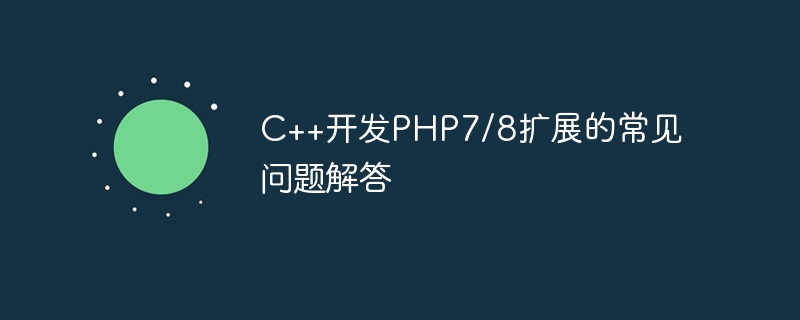
C Frequently Asked Questions about Developing PHP7/8 Extensions
Introduction:
PHP is a popular server-side scripting language, and C is a high-level A high-performance systems-level programming language. In some cases, we need to use the functionality of C by developing PHP extensions. This article will answer common problems encountered in the development of PHP7/8 extensions in C and provide some solutions.
Question 1: How to call PHP functions in C?
Calling a PHP function in C requires implementing a specific function prototype and using the macro provided by PHP to reference the function. The specific steps are as follows:
- First, declare the PHP function to be called in C, and use extern "C" to modify the function declaration to ensure that the symbol names are linked in the C language.
- In the initialization function of the PHP extension, use the PHP macro zend_function_entry to declare the PHP function to be exported. Among them, the name field of each function item should be consistent with the name of the PHP function.
- Implement the declared function in C and call the PHP function in it. You can use the macros provided by PHP to check the type and number of parameters, and use the functions provided by PHP to call PHP functions.
Question 2: How to return PHP variables in C?
Returning PHP variables in C requires the use of functions and macros provided by PHP. The specific steps are as follows:
- Declare the PHP variable to be returned in C and use the ZVAL macro to define a variable.
- Use the functions provided by PHP to convert C variables to PHP variable types.
- Use RETURN macro to return PHP variables.
Question 3: How to deal with strings in PHP?
When processing PHP strings in C, you need to pay attention to string encoding and memory management. The specific steps are as follows:
- Use the function provided by PHP to convert the PHP string into a C string. The value of a string can be accessed using the zend_string and ZSTR_VAL macros.
- When processing strings in C, pay attention to the encoding of the string. You can use the functions provided by PHP to check and convert the encoding of a string.
- When returning a string in C, you need to use the ZEND_STR_INIT macro to initialize a zend_string object, and use the RETURN_STR macro to return the string.
Question 4: How to deal with PHP arrays?
To process PHP arrays in C, you need to use the functions and macros provided by PHP. The specific steps are as follows:
- Use the function provided by PHP to convert the PHP array into a C array. Array keys and values can be accessed using the zend_array and zend_hash_* series of functions.
- When dealing with arrays in C, pay attention to the type and length of the array. You can use the functions provided by PHP to check and get the type and length of the array.
- When returning an array in C, you need to use the functions provided by PHP to create a PHP array, and use the RETURN_ARR macro to return the array.
Question 5: How to throw exceptions and handle exceptions?
Throwing exceptions in C requires the use of macros and classes provided by PHP. The specific steps are as follows:
- Use the macro zend_throw_exception provided by PHP to throw an exception. You can specify the exception class and error message.
- In the initialization function of the PHP extension, use the function zend_register_class_ex provided by PHP to register an exception class for C calls.
- When handling exceptions in C, you can use the macros zend_try and zend_catch provided by PHP to capture and handle exceptions.
Conclusion:
This article answers common questions in the process of developing PHP7/8 extensions using C and provides solutions. During the development process, you need to be familiar with the functions and macros of PHP and C, as well as the basic principles of PHP extension development. By using these technologies appropriately, high-performance PHP extensions can be achieved to add more functionality to PHP applications.
The above is the detailed content of FAQs for developing PHP7/8 extensions in C++. For more information, please follow other related articles on the PHP Chinese website!






